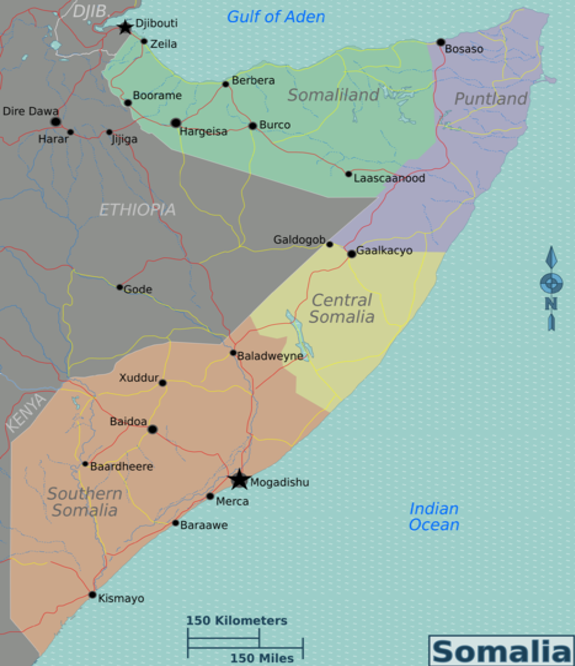Somalia and its autonomous regions are the latest victim to a vociferous broader regional geopolitical rivalry that has emerged following the 2011 Arab Uprisings. Left unchecked, this competition for political, economic, and military supremacy will serve to further undermine stability and cohesion within Somalia and its semi-autonomous regions of Somaliland and Puntland. Located at the mouth of the Red Sea corridor, further destabilization of this already fragile state could have wide-reaching ramifications that extend beyond the broader Middle East and North Africa.
This competition for control over the regional balance of power is between what can be called the “activists” and the “counterrevolutionaries.” The “activists” are those regional states – Turkey and Qatar – that have sought greater independence in their foreign policy agendas and generally supported the revolutionary currents throughout the 2011 Arab Uprisings and their aftermath. The uprisings presented both states with the opportunity to utilize more proactive foreign policies to potentially tip the regional balance of power in their favor. Opposed to this camp are the “counterrevolutionaries” – Saudi Arabia, the United Arab Emirates, and post-2013 Egypt – all of whom have generally sought to quell the tide of popular activism and return to the pre-uprisings status quo. This rivalry culminated in the 2017 blockade of Qatar launched by the counterrevolutionary states in what is now popularly termed the “Gulf crisis.”
Although Somalia did not experience the wave of mass mobilization that swept across the region in 2011, it has nevertheless increasingly become a site of competition between these two rival camps, primarily due to its geostrategic location at the mouth of the Gulf of Aden and the Red Sea corridor. This competition has accelerated dramatically following the eruption of the Gulf crisis in 2017. After the blockade was announced, Somali President Mohamed Abdullahi Mohamed – known as Farmajo – was reportedly under intense pressure from Gulf powers to pick a side in the conflict. Despite this pressure, President Farmajo declared Somalia’s neutrality in the conflict, deeply angering the counterrevolutionaries. However, the leadership of the semi-autonomous regions of Somaliland and Puntland broke with Mogadishu and expressed publicly their support for the blockade launched by the counterrevolutionaries. In response to President Farmajo’s reluctance to bow to the demands of the Saudis and Emiratis, the counterrevolutionaries slashed budgetary support for the Somali central government, withdrew diplomatic personnel from the capital, and doubled-down on a strategy of supporting Somalia’s semi-autonomous regions as a counterweight to the central Somali authority.
Casting its weight behind Somalia’s semi-autonomous regions, the UAE has signed a 25-year lease with Somaliland to develop and maintain a military base there and agreed in 2017 to invest $336 million as part of a 30-year contract to expand and run a commercial port in Puntland’s Bosaso. The UAE has also recently invested an additional $442 million in Somaliland’s Berbera port. In addition to working within Somalia’s semi-autonomous regions, the UAE has financed candidates for political office within Somalia proper “such as former Somali Prime Minister Omar Abdirashid Sharmarke, and opposition figure Abdirahman Warsame in another attempt to sway Mogadishu towards Abu Dhabi, or at least fracture the Somali government.” Tensions also erupted in April 2018, when Somali authorities seized $10 million in cash from an arriving Emirati airplane, which was cited by government officials as evidence of Emirati meddling. According to Abukar Arman, a former Somali diplomat who served as Somalia’s Special Envoy to the United States, the UAE has “bankrolled various mercenary groups engaged in various clandestine operations that ultimately sustain [Somalia’s] status quo.” Most recently, Somali authorities are reported to have arrested an alleged spy network working for the UAE inside Somalia.
In response to the actions taken by the counterrevolutionaries, Somalia’s central government under President Farmajo has dramatically increased its diplomatic, economic, and military relations with Qatar and Turkey. Beginning with Turkey, President Recep Tayyip Erdogan made history in 2011 when he became the first non-African government leader to visit Somalia since the state’s collapse in 1991. Turkey has also built its largest foreign embassy in Mogadishu; developed its largest overseas military facility in Somalia; and Turkish firms are widely visible throughout the country building roads and hospitals. Moreover, while the volume of trade between Turkey and Somalia was $5 million in 2010, it reached $123 million in 2016. Ankara has also signaled its desire to increase weapons sales to Mogadishu. This increase in bilateral relations between Somalia and Turkey have also been lauded by Somalia’s Ministry of Foreign Affairs. Qatar has similarly increased its relations with Somalia’s central government. The Qataris helped finance President Farmajo’s reelection campaign in 2017; provided large amounts of economic and military aid to the country; built a new seaport off the coast of Somalia’s Hobyo; and airlifted Mogadishu’s mayor to Doha for emergency medical treatment following an attack by al-shabab. Qatari media outlets such as Al-Jazeera have also been increasingly critical of Emirati actions within Somalia.
Competition between these two blocs is undermining stability and cohesion within Somalia by exacerbating deep fissures within an already broken state. By inflaming intra-Somali tensions and disputes, the activist and counterrevolutionary blocs are worsening the Somali state’s already dysfunctional system. Moreover, continued heightened internal tensions undermine the stability of the Red Sea corridor. Unless this international rivalry within Somalia is stymied, the prospects of the country being able to address its problems appears bleak.
Jonathan Hoffman is a political science PhD student at George Mason University’s SCHAR School of Policy and Government. He holds an M.A. in Middle East and Islamic Studies and a B.A. in Global Affairs. His work has been featured in Middle East Policy, the Cornell International Affairs Review, The Cipher Brief, and other platforms. His research focuses on Middle East geopolitics and political Islam.
Photo can be found here.




